AI
-
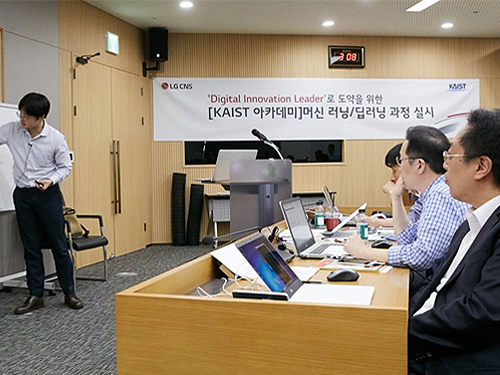 KAIST AI Academy for LG CNS Employees
The Department of Industrial & Systems Engineering (Graduate School of Knowledge Service Engineering) at KAIST has collaborated with LG CNS to start a full-fledged KAIST AI Academy course after the two-week pilot course for employees of LG CNS, a Korean company specializing in IT services.
Approximately 100 employees participated in the first KAIST AI Academy course held over two weeks from August 24 to September 1. LG CNS is planning to enroll a total of 500 employees in this course by the end of the year.
Artificial intelligence is widely recognized as essential technology in various industries. In that sense, the KAIST AI Academy course was established to reinforce both the AI technology and the business ability of the company. In addition, it aims at leading employees to develop new business using novel technologies. The main contents of this course are as follows: i) discussing AI technology development and its influence on industries; ii) understanding AI technologies and acquiring the major technologies applicable to business; and iii) introducing cases of AI applications and deep learning.
During the course, seven professors with expertise in AI deep learning from the Department of Industrial & Systems Engineering (Graduate School of Knowledge Service Engineering), including Jae-Gil Lee and Jinkyoo Park will be leading the class, including practical on-site educational programs.
Based on the accumulated business experience integrated with the latest AI technology, LG CNS has been making an effort to find new business opportunities to support companies that are hoping to make digital innovations.
The company aims to reinforce the AI capabilities of its employees and is planning to upgrade the course in a sustainable manner. It will also foster outside manpower by expanding the AI education to its clients who pursue manufacturing reinforcement and innovation in digital marketing.
Seong Wook Lee, the Director of the AI and Big Data Business Unit said, “As AI plays an important role in business services, LG CNS decided to open the KAIST AI Academy course to deliver better value to our clients by incorporating our AI-based business cases and KAIST’s up-to-date knowledge.”
2017.09.06 View 8364
KAIST AI Academy for LG CNS Employees
The Department of Industrial & Systems Engineering (Graduate School of Knowledge Service Engineering) at KAIST has collaborated with LG CNS to start a full-fledged KAIST AI Academy course after the two-week pilot course for employees of LG CNS, a Korean company specializing in IT services.
Approximately 100 employees participated in the first KAIST AI Academy course held over two weeks from August 24 to September 1. LG CNS is planning to enroll a total of 500 employees in this course by the end of the year.
Artificial intelligence is widely recognized as essential technology in various industries. In that sense, the KAIST AI Academy course was established to reinforce both the AI technology and the business ability of the company. In addition, it aims at leading employees to develop new business using novel technologies. The main contents of this course are as follows: i) discussing AI technology development and its influence on industries; ii) understanding AI technologies and acquiring the major technologies applicable to business; and iii) introducing cases of AI applications and deep learning.
During the course, seven professors with expertise in AI deep learning from the Department of Industrial & Systems Engineering (Graduate School of Knowledge Service Engineering), including Jae-Gil Lee and Jinkyoo Park will be leading the class, including practical on-site educational programs.
Based on the accumulated business experience integrated with the latest AI technology, LG CNS has been making an effort to find new business opportunities to support companies that are hoping to make digital innovations.
The company aims to reinforce the AI capabilities of its employees and is planning to upgrade the course in a sustainable manner. It will also foster outside manpower by expanding the AI education to its clients who pursue manufacturing reinforcement and innovation in digital marketing.
Seong Wook Lee, the Director of the AI and Big Data Business Unit said, “As AI plays an important role in business services, LG CNS decided to open the KAIST AI Academy course to deliver better value to our clients by incorporating our AI-based business cases and KAIST’s up-to-date knowledge.”
2017.09.06 View 8364 -
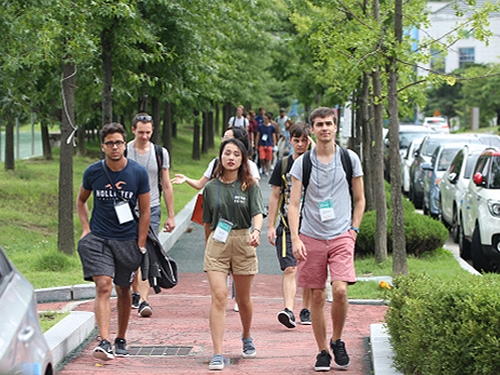 International Students Start a New Semester at KAIST
(International students during a campus tour)
The 2017 fall semester began on August 28 and new and returning students are filling the campus. Our international students are one of the reasons the campus is becoming more dynamic and energetic.
It was easy to see groups of smiling international students walking around the campus. Every semester, KAIST welcomes hundreds of students from around the world to give them the opportunity to study at a world-leading university in science and technology.
This semester, approximately 150 students in degree-seeking programs and 220 exchange students from a total of 74 countries, including Germany, the United States, and France entered KAIST.
(Frederik Hansen, a student from DTU)
Frederik Hansen is an exchange student who came to KAIST this semester from Copenhagen, Denmark. He completed the undergraduate program at the Technical University of Denmark (DTU) and is now pursuing a master’s degree.
He decided to join KAIST because he felt the university is up-to-date with subjects in his field of interest.
Frederik, who majored in mechanical engineering, looks forward taking classes related to robotics and solid mechanics. Noting that it’s his first time visiting Asia, he hopes to experience and learn about Korean culture.
In an effort to help foreign students’ soft landing in KAIST, the International Office held a series of orientation programs over three days. The buddy program provides international freshmen with an opportunity to make Korean friends for a more successful life at KAIST, while giving domestic students a chance to learn about different cultures and perhaps build on the global capacity required for becoming a global leader. Information sessions also provided educational information that can support international students living in KAIST. Finally, the counseling program gives information about the KAIST counseling center and ISSS (International Scholar and Student Service). It provides a psychometric test service to those who wish to take it.
If you are interested in pursuing academic programs at KAIST, please visit the International Office via http://io.kaist.ac.kr/index.do .
2017.08.30 View 7427
International Students Start a New Semester at KAIST
(International students during a campus tour)
The 2017 fall semester began on August 28 and new and returning students are filling the campus. Our international students are one of the reasons the campus is becoming more dynamic and energetic.
It was easy to see groups of smiling international students walking around the campus. Every semester, KAIST welcomes hundreds of students from around the world to give them the opportunity to study at a world-leading university in science and technology.
This semester, approximately 150 students in degree-seeking programs and 220 exchange students from a total of 74 countries, including Germany, the United States, and France entered KAIST.
(Frederik Hansen, a student from DTU)
Frederik Hansen is an exchange student who came to KAIST this semester from Copenhagen, Denmark. He completed the undergraduate program at the Technical University of Denmark (DTU) and is now pursuing a master’s degree.
He decided to join KAIST because he felt the university is up-to-date with subjects in his field of interest.
Frederik, who majored in mechanical engineering, looks forward taking classes related to robotics and solid mechanics. Noting that it’s his first time visiting Asia, he hopes to experience and learn about Korean culture.
In an effort to help foreign students’ soft landing in KAIST, the International Office held a series of orientation programs over three days. The buddy program provides international freshmen with an opportunity to make Korean friends for a more successful life at KAIST, while giving domestic students a chance to learn about different cultures and perhaps build on the global capacity required for becoming a global leader. Information sessions also provided educational information that can support international students living in KAIST. Finally, the counseling program gives information about the KAIST counseling center and ISSS (International Scholar and Student Service). It provides a psychometric test service to those who wish to take it.
If you are interested in pursuing academic programs at KAIST, please visit the International Office via http://io.kaist.ac.kr/index.do .
2017.08.30 View 7427 -
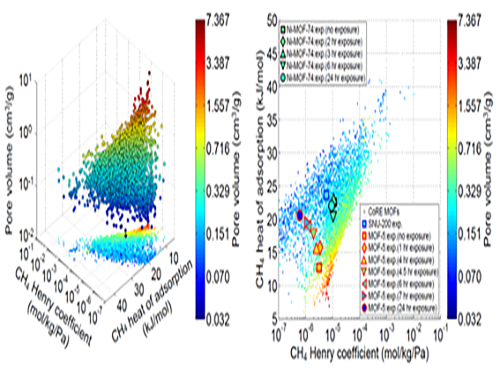 Analysis of Gas Adsorption Properties for Amorphous Porous Materials
Professor Jihan Kim from the Department of Chemical and Biomolecular Engineering at KAIST has developed a method to predict gas adsorption properties of amorphous porous materials.
Metal-organic frameworks (MOFs) have large surface area and high density of pores, making them appropriate for various energy and environmental-related applications. And although most MOFs are crystalline, these structures can deform during synthesis and/or industrial processes, leading to loss in long-range order. Unfortunately, without the structural information, existing computer simulation techniques cannot be used to model these materials.
In this research, Professor Kim’s research team demonstrated that one can replace the material properties of structurally deformed MOFs with those of crystalline MOFs to indirectly analyze/model the material properties of amorphous materials. First, the team conducted simulations on methane gas adsorption properties for over 12,000 crystalline MOFs to obtain a large training set data, and created a resulting structure-property map. Upon mapping the experimental data of amorphous MOFs onto the structure-property map, results showed that regardless of crystallinity, the gas adsorption properties of MOFs showed congruence and consistency amongst one another.
Based on these findings, selected crystalline MOFs with the most similar gas adsorption properties as the collapsed structure from the 12,000 candidates. Then, the team verified that the adsorption properties of these similar MOFs can be successfully transferred to the deformed MOFs across different temperatures and even to different gas molecules (e.g. hydrogen), demonstrating transferability of properties.
These findings allow material property prediction in porous materials such as MOFs without structural information, and the techniques here can be used to better predict and understand optimal materials for various applications including, carbon dioxide capture, gas storage and separations.
This research was conducted in collaboration with Professor Dae-Woon Lim at Kyoto University, Professor Myunghyun Paik at Seoul National University, Professor Minyoung Yoon at Gachon University, and Aadesh Harale at Saudi Arabian Oil Company. The research was published in the Proceedings of the National Academy of Sciences (PNAS) online on 10 July and the co-first authors were Ph. D. candidate WooSeok Jeong and Professor Dae-Woon Lim.
This research was funded by the Saudi Aramco-KAIST CO2 Management Center.
(Figure 1. Trends in structure - material property map and in collapsed structures)
(Figure 2. Transferability between the experimental results of collapsed MOFs and the simulation results of crystalline MOFs)
2017.07.26 View 10707
Analysis of Gas Adsorption Properties for Amorphous Porous Materials
Professor Jihan Kim from the Department of Chemical and Biomolecular Engineering at KAIST has developed a method to predict gas adsorption properties of amorphous porous materials.
Metal-organic frameworks (MOFs) have large surface area and high density of pores, making them appropriate for various energy and environmental-related applications. And although most MOFs are crystalline, these structures can deform during synthesis and/or industrial processes, leading to loss in long-range order. Unfortunately, without the structural information, existing computer simulation techniques cannot be used to model these materials.
In this research, Professor Kim’s research team demonstrated that one can replace the material properties of structurally deformed MOFs with those of crystalline MOFs to indirectly analyze/model the material properties of amorphous materials. First, the team conducted simulations on methane gas adsorption properties for over 12,000 crystalline MOFs to obtain a large training set data, and created a resulting structure-property map. Upon mapping the experimental data of amorphous MOFs onto the structure-property map, results showed that regardless of crystallinity, the gas adsorption properties of MOFs showed congruence and consistency amongst one another.
Based on these findings, selected crystalline MOFs with the most similar gas adsorption properties as the collapsed structure from the 12,000 candidates. Then, the team verified that the adsorption properties of these similar MOFs can be successfully transferred to the deformed MOFs across different temperatures and even to different gas molecules (e.g. hydrogen), demonstrating transferability of properties.
These findings allow material property prediction in porous materials such as MOFs without structural information, and the techniques here can be used to better predict and understand optimal materials for various applications including, carbon dioxide capture, gas storage and separations.
This research was conducted in collaboration with Professor Dae-Woon Lim at Kyoto University, Professor Myunghyun Paik at Seoul National University, Professor Minyoung Yoon at Gachon University, and Aadesh Harale at Saudi Arabian Oil Company. The research was published in the Proceedings of the National Academy of Sciences (PNAS) online on 10 July and the co-first authors were Ph. D. candidate WooSeok Jeong and Professor Dae-Woon Lim.
This research was funded by the Saudi Aramco-KAIST CO2 Management Center.
(Figure 1. Trends in structure - material property map and in collapsed structures)
(Figure 2. Transferability between the experimental results of collapsed MOFs and the simulation results of crystalline MOFs)
2017.07.26 View 10707 -
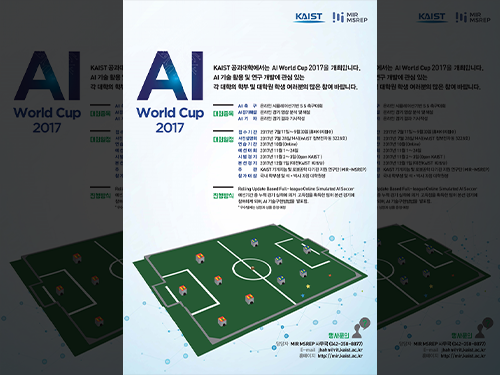 KAIST to Host the 2017 AI World Cup in November
KAIST, the birthplace of the Robot World Cup in 1996, now presents a new technology matchup, the AI World Cup this November, which will be held at KAIST. The event is being organized by the Machine Intelligence and Robotics Multi-Sponsored Research and Education Platform (MIR-MSREP) of KAIST. The online, simulated AI soccer game, based on rolling updates, will be a draw for avid online gamers and tech-savvy university students from around the nation.
The tournament is comprised of three events: ▲A 5 on 5 AI soccer match to be played after self-learning using AI technology in an online simulation environment ▲Commentary in which online soccer videos are analyzed and commented on, and ▲Game reporters who will write articles on online soccer event results.
The participants will undergo a month-long online practice period in October and compete in preliminary matches from November 1 through 24. The top teams that scored the highest accumulated points will compete in the finals on December 1. In the finals, each team’s AI technology implementation method will be evaluated to select the final winning team. To ensure a successful event, KAIST will host a briefing session for participants on July 28.
Technological prowess and early exposure to AI accumulated at KAIST led to the launching of this tournament. Professor Jong-Hwan Kim, the chair of the Organizing Committee of the AI World Cup, hosted the first ever Robot World Cup back in 1996. His concept has now evolved into the emerging technology of AI and the members of the Organizing Committee encompass the professors from the various departments of electrical engineering, computing, industrial and systems engineering, aerospace engineering, civil and environmental engineering, and the graduate schools of Green Transportation, Cultural Technology, and Science and Technology Policy.
In particular, ongoing convergence research initiatives incorporating AI into a wide arrays of disciplines such as bio, nano, and IT, played a crucial role for making this AI World Cup happen. Professor Kim said, “The winner of this year’s competition will be awarded a certificate and a small gift. In 2018, we aim to expand the event to an international scale by allowing international teams.”
Any undergraduate or graduate student in Korea can apply to participate in the ‘AI World Cup 2017’. KAIST will host a public trial event during the ‘Open KAIST’ event period to be held November 2-3 to help participating students understand the event better. ‘Open KAIST’ allows the general public to personally visit and experience what goes on in engineering departments and laboratories on the KAIST main campus. It is hosted by the College of Engineering every two years and is the largest event hosted by KAIST.
To participate in the ‘AI World Cup 2017,’ teams consisting of Korean undergraduates or graduate students can fill out application forms and submit them by September 30 on http://mir.kaist.ac.kr .
2017.07.14 View 13270
KAIST to Host the 2017 AI World Cup in November
KAIST, the birthplace of the Robot World Cup in 1996, now presents a new technology matchup, the AI World Cup this November, which will be held at KAIST. The event is being organized by the Machine Intelligence and Robotics Multi-Sponsored Research and Education Platform (MIR-MSREP) of KAIST. The online, simulated AI soccer game, based on rolling updates, will be a draw for avid online gamers and tech-savvy university students from around the nation.
The tournament is comprised of three events: ▲A 5 on 5 AI soccer match to be played after self-learning using AI technology in an online simulation environment ▲Commentary in which online soccer videos are analyzed and commented on, and ▲Game reporters who will write articles on online soccer event results.
The participants will undergo a month-long online practice period in October and compete in preliminary matches from November 1 through 24. The top teams that scored the highest accumulated points will compete in the finals on December 1. In the finals, each team’s AI technology implementation method will be evaluated to select the final winning team. To ensure a successful event, KAIST will host a briefing session for participants on July 28.
Technological prowess and early exposure to AI accumulated at KAIST led to the launching of this tournament. Professor Jong-Hwan Kim, the chair of the Organizing Committee of the AI World Cup, hosted the first ever Robot World Cup back in 1996. His concept has now evolved into the emerging technology of AI and the members of the Organizing Committee encompass the professors from the various departments of electrical engineering, computing, industrial and systems engineering, aerospace engineering, civil and environmental engineering, and the graduate schools of Green Transportation, Cultural Technology, and Science and Technology Policy.
In particular, ongoing convergence research initiatives incorporating AI into a wide arrays of disciplines such as bio, nano, and IT, played a crucial role for making this AI World Cup happen. Professor Kim said, “The winner of this year’s competition will be awarded a certificate and a small gift. In 2018, we aim to expand the event to an international scale by allowing international teams.”
Any undergraduate or graduate student in Korea can apply to participate in the ‘AI World Cup 2017’. KAIST will host a public trial event during the ‘Open KAIST’ event period to be held November 2-3 to help participating students understand the event better. ‘Open KAIST’ allows the general public to personally visit and experience what goes on in engineering departments and laboratories on the KAIST main campus. It is hosted by the College of Engineering every two years and is the largest event hosted by KAIST.
To participate in the ‘AI World Cup 2017,’ teams consisting of Korean undergraduates or graduate students can fill out application forms and submit them by September 30 on http://mir.kaist.ac.kr .
2017.07.14 View 13270 -
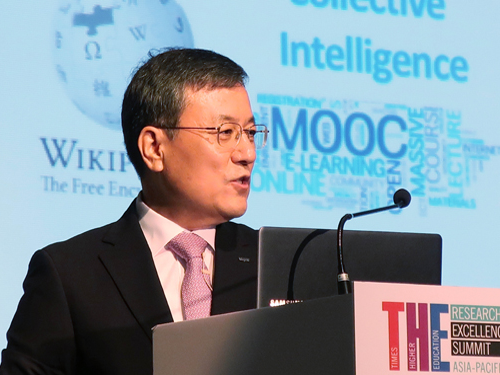 Reform of Universities Key in the Wake of the 4th Industrial Revolution
(President Shin makes a keynote speech at the Times Higher Education Research Excellence Summit held in Taiwan on July 4.)
KAIST President Sung-Chul Shin stressed that innovations in education, research, and technology commercialization of universities are critical for responding to the transformations that the Fourth Industrial Revolution will bring about.
In his keynote speech at the Times Higher Education Research Excellence Summit held in Taiwan on July 4, he cited connectivity, superintelligence, and convergence in science and technology as three components the Fourth Industrial Revolution will pierce, saying the speed and breadth of the transformation will be beyond our imagination. He also presented megatrends in science and technology in the years to come and how KAIST is addressing the challenges and opportunities.
“It is imperative to foster creative young talents fluent in convergence, collaboration, and communication skills in the new era. To this end, we need to focus on whole brain education by enhancing basic education in science and engineering plus humanities and social studies,” he stressed. He also presented a Non-Departmental Education Track, which KAIST plans to implement from next semester. The track, designed to prepare students for the new industrial era, will focus on whole brain education including entrepreneurship and leadership education during the undergraduate period.
He also emphasized an effective new teaching methodology. “We need to develop various new teaching methods. The paradigm should shift from lecturer-centered to student-centered. KAIST is revising our curriculum to facilitate team-based, project-based learning and flipped learning,” he explained.
President Shin also pointed out that the educational goals for the next generation should be to sustain the value of people’s own thoughtfulness, wisdom, emotion, and caring against the advent of a new tribe of AI, dubbed Robo Sapiens. “Those traits add undeniable educational value that we should continue to pursue even in the era of Robo Sapiens,” he added.
As for research innovation, he emphasized inter- and multi-disciplinary collaborative research. “Especially, in addressing pressing global issues and big science, international collaboration will be very effective and crucial,” he said.
At the summit, convergence research projects currently underway at KAIST using emerging technologies such as the smart mobile healthcare project, Dr, M; the humanoid robot, HUBO; and AI drone swarms drew lots of attention from the participants, even receiving proposals to join the projects as collaborators.
In the new era, according to Shin, technology commercialization at universities will emerge as a hub of R&DB. Citing that KAIST has long been a draw for startups, he noted that KAIST has also set a high value on entrepreneurship education including social entrepreneurship and startups.
He continued, “The Korean government is making every effort to harness the challenges and opportunities of the Fourth Industrial Revolution by creating a new economic growth engine. For the success of the government initiative, universities should also respond to make innovations commensurate with the changing needs and challenges. KAIST will take the lead in this new initiative for making a new future.”
2017.07.06 View 8615
Reform of Universities Key in the Wake of the 4th Industrial Revolution
(President Shin makes a keynote speech at the Times Higher Education Research Excellence Summit held in Taiwan on July 4.)
KAIST President Sung-Chul Shin stressed that innovations in education, research, and technology commercialization of universities are critical for responding to the transformations that the Fourth Industrial Revolution will bring about.
In his keynote speech at the Times Higher Education Research Excellence Summit held in Taiwan on July 4, he cited connectivity, superintelligence, and convergence in science and technology as three components the Fourth Industrial Revolution will pierce, saying the speed and breadth of the transformation will be beyond our imagination. He also presented megatrends in science and technology in the years to come and how KAIST is addressing the challenges and opportunities.
“It is imperative to foster creative young talents fluent in convergence, collaboration, and communication skills in the new era. To this end, we need to focus on whole brain education by enhancing basic education in science and engineering plus humanities and social studies,” he stressed. He also presented a Non-Departmental Education Track, which KAIST plans to implement from next semester. The track, designed to prepare students for the new industrial era, will focus on whole brain education including entrepreneurship and leadership education during the undergraduate period.
He also emphasized an effective new teaching methodology. “We need to develop various new teaching methods. The paradigm should shift from lecturer-centered to student-centered. KAIST is revising our curriculum to facilitate team-based, project-based learning and flipped learning,” he explained.
President Shin also pointed out that the educational goals for the next generation should be to sustain the value of people’s own thoughtfulness, wisdom, emotion, and caring against the advent of a new tribe of AI, dubbed Robo Sapiens. “Those traits add undeniable educational value that we should continue to pursue even in the era of Robo Sapiens,” he added.
As for research innovation, he emphasized inter- and multi-disciplinary collaborative research. “Especially, in addressing pressing global issues and big science, international collaboration will be very effective and crucial,” he said.
At the summit, convergence research projects currently underway at KAIST using emerging technologies such as the smart mobile healthcare project, Dr, M; the humanoid robot, HUBO; and AI drone swarms drew lots of attention from the participants, even receiving proposals to join the projects as collaborators.
In the new era, according to Shin, technology commercialization at universities will emerge as a hub of R&DB. Citing that KAIST has long been a draw for startups, he noted that KAIST has also set a high value on entrepreneurship education including social entrepreneurship and startups.
He continued, “The Korean government is making every effort to harness the challenges and opportunities of the Fourth Industrial Revolution by creating a new economic growth engine. For the success of the government initiative, universities should also respond to make innovations commensurate with the changing needs and challenges. KAIST will take the lead in this new initiative for making a new future.”
2017.07.06 View 8615 -
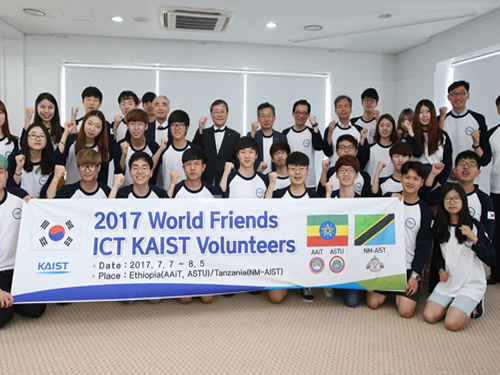 2017 World Friends ICT KAIST Sets Off to Ethiopia, Tanzania
KAIST launched the ‘2017 World Friends ICT KAIST’ on 21 June at a ceremony held at the Faculty Club. The event was attended by 40 student volunteers and faculty members including President Sung-Chul Shin and student volunteers.
The ‘2017 World Friends ICT KAIST’ is an oversees volunteer program aimed at providing ICT education for students from developing countries and for cultural exchange. The program was organized by the KAIST Leadership Center and sponsored by the National Information Agency (NIA) since 2015.
President Sung-Chul Shin delivered words of encouragement to start the opening ceremony, followed by an oath-taking by the volunteer group, safety training, and a commemorative photoshoot. This year’s World Friends ICT volunteer group consisted of 32 students and 2 staff members to lead and to support the team.
The group was divided into eight teams including APP-frica, KAI-Tigers, and WITH (4 members per team) to volunteer in Addis Ababa Institute of Technology (AAIT) and Adama Science and Technology University in Ethiopia (ASTU), as well as Nelson Mandela African Institute of Science and Technology (NM-AIST) in Tanzania. The teams will educate local students on ICT and promote cultural exchanges. The volunteer period is from July 7 to August 5, lasting about a month.
KAIST conducted primary document examinations and interviews from April 27 to May 18 on volunteer candidates who registered to take part, and selected 32 student volunteers. A total of 68 students registered to volunteer, resulting in a 1:2.1 competition rate.
The volunteering program was customized to the local needs of Ethiopia and Tanzania and thus consisted of ICT education, cultural exchanges, volunteering at farms on the weekends, and science experiments. The area with the most focus by the volunteer team is ICT education, which accounts for 70% of the total volunteer activities. The aim is to educate Ethiopian students at AAIT and ASTU on Windows, MS Office, Adobe Photoshop, and using smartphones. In Tanzania, the team is to volunteer with students of NM-AIST to provide ICT application education such as water tank control using appropriate technology and Arduino to local high school students.
The team is also planning to promote cultural exchanges by preparing K-Pop dancing, traditional Korean games such as Korean shuttlecock game (jegichagi) and Korean wrestling (ssireum), traditional cooking such as bibimbab and half-moon-shaped rice cake (songpyeon), and teaching the Korean language, as well as preparing cultural performances with local university students. On the weekends, the team will visit local farms to volunteer, and local elementary schools and orphanages to conduct science experiments for children, as well as physical education and art activities.
(Photo caption: Volunteers poses with faculty and staff members including President Sung-Chul Shin at a ceremony on June 21.)
2017.06.29 View 12711
2017 World Friends ICT KAIST Sets Off to Ethiopia, Tanzania
KAIST launched the ‘2017 World Friends ICT KAIST’ on 21 June at a ceremony held at the Faculty Club. The event was attended by 40 student volunteers and faculty members including President Sung-Chul Shin and student volunteers.
The ‘2017 World Friends ICT KAIST’ is an oversees volunteer program aimed at providing ICT education for students from developing countries and for cultural exchange. The program was organized by the KAIST Leadership Center and sponsored by the National Information Agency (NIA) since 2015.
President Sung-Chul Shin delivered words of encouragement to start the opening ceremony, followed by an oath-taking by the volunteer group, safety training, and a commemorative photoshoot. This year’s World Friends ICT volunteer group consisted of 32 students and 2 staff members to lead and to support the team.
The group was divided into eight teams including APP-frica, KAI-Tigers, and WITH (4 members per team) to volunteer in Addis Ababa Institute of Technology (AAIT) and Adama Science and Technology University in Ethiopia (ASTU), as well as Nelson Mandela African Institute of Science and Technology (NM-AIST) in Tanzania. The teams will educate local students on ICT and promote cultural exchanges. The volunteer period is from July 7 to August 5, lasting about a month.
KAIST conducted primary document examinations and interviews from April 27 to May 18 on volunteer candidates who registered to take part, and selected 32 student volunteers. A total of 68 students registered to volunteer, resulting in a 1:2.1 competition rate.
The volunteering program was customized to the local needs of Ethiopia and Tanzania and thus consisted of ICT education, cultural exchanges, volunteering at farms on the weekends, and science experiments. The area with the most focus by the volunteer team is ICT education, which accounts for 70% of the total volunteer activities. The aim is to educate Ethiopian students at AAIT and ASTU on Windows, MS Office, Adobe Photoshop, and using smartphones. In Tanzania, the team is to volunteer with students of NM-AIST to provide ICT application education such as water tank control using appropriate technology and Arduino to local high school students.
The team is also planning to promote cultural exchanges by preparing K-Pop dancing, traditional Korean games such as Korean shuttlecock game (jegichagi) and Korean wrestling (ssireum), traditional cooking such as bibimbab and half-moon-shaped rice cake (songpyeon), and teaching the Korean language, as well as preparing cultural performances with local university students. On the weekends, the team will visit local farms to volunteer, and local elementary schools and orphanages to conduct science experiments for children, as well as physical education and art activities.
(Photo caption: Volunteers poses with faculty and staff members including President Sung-Chul Shin at a ceremony on June 21.)
2017.06.29 View 12711 -
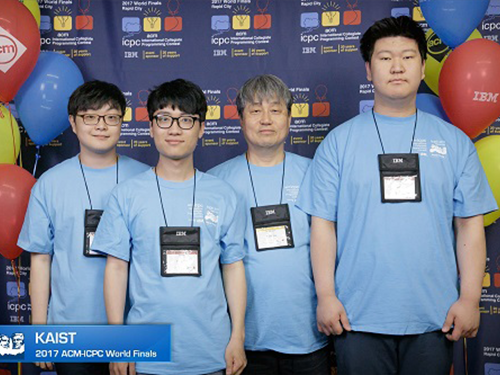 KAIST Team Wins Bronze Medal at Int'l Programming Contest
A KAIST Team consisting of undergraduate students from the School of Computing and Department of Mathematical Science received a bronze medal and First Problem Solver award at an international undergraduate programming competition, The Association for Computing Machinery-International Collegiate Programming Contest (ACM-ICPC) World Finals.
The 41st ACM-ICPC hosted by ACM and funded by IBM was held in South Dakota in the US on May 25. The competition, first held in 1977, is aimed at undergraduate students from around the world. A total of 50,000 students from 2900 universities and 103 countries participated in the regional competition and 400 students competed in the finals.
The competition required teams of three to solve 12 problems. The KAIST team was coached by Emeritus Professor Sung-Yong Shin and Professor Taisook Han. The student contestants were Jihoon Ko and Hanpil Kang from the School of Computing and Jongwoon Lee from the Department of Mathematical Science. The team finished ranked 9th, receiving a bronze medal and a $3000 prize. Additionally, the team was the first to solve all the problems and received the First Problem Solver award. Detailed score information can be found on. https://icpc.baylor.edu/scoreboard/
(Photo caption: Professor Taisook Han and his students)
2017.06.12 View 11541
KAIST Team Wins Bronze Medal at Int'l Programming Contest
A KAIST Team consisting of undergraduate students from the School of Computing and Department of Mathematical Science received a bronze medal and First Problem Solver award at an international undergraduate programming competition, The Association for Computing Machinery-International Collegiate Programming Contest (ACM-ICPC) World Finals.
The 41st ACM-ICPC hosted by ACM and funded by IBM was held in South Dakota in the US on May 25. The competition, first held in 1977, is aimed at undergraduate students from around the world. A total of 50,000 students from 2900 universities and 103 countries participated in the regional competition and 400 students competed in the finals.
The competition required teams of three to solve 12 problems. The KAIST team was coached by Emeritus Professor Sung-Yong Shin and Professor Taisook Han. The student contestants were Jihoon Ko and Hanpil Kang from the School of Computing and Jongwoon Lee from the Department of Mathematical Science. The team finished ranked 9th, receiving a bronze medal and a $3000 prize. Additionally, the team was the first to solve all the problems and received the First Problem Solver award. Detailed score information can be found on. https://icpc.baylor.edu/scoreboard/
(Photo caption: Professor Taisook Han and his students)
2017.06.12 View 11541 -
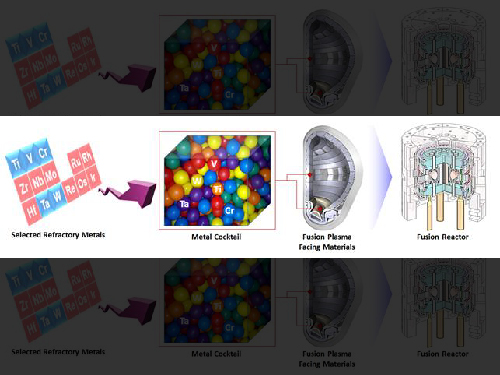 Extreme Materials for Fusion with Metal Cocktail
The research team under Professor Ryu Ho-jin of the Department of Nuclear and Quantum Engineering has developed a new material for facing fusion plasma environments using metal powder mixing technology. This technology is expected to extend the range of materials that can be designed for use in extreme environments such as in fusion power generators.
The durability of the tokamak vessel, which holds high-temperature plasma, is very important to create fusion power reactors, which are expected to be a future energy source. Currently, high-melting-point metals, such as tungsten, are considered plasma-facing materials to protect the tokamak vessel. However, high-energy thermal shocks, plasma ions, and neutrons are fatal to the plasma-facing material during high temperature fusion plasma operation. Therefore, it is necessary to develop new high-performance materials.
The ITER project, in which seven countries including the United States, the EU, and Korea participate jointly, is constructing a nuclear fusion experimental reactor in France with the goal of achieving the first plasma in 2025 and deuterium-tritium fusion operation in 2035. In Korea, the KSTAR tokamak at the National Fusion Research Institute has succeeded in maintaining high-performance plasma for 70 seconds.
Researchers in Europe, the United States, and China, who are leading the research on fusion plasma-facing materials, are studying the improvement of physical properties by adding a small amount of metal elements to tungsten. However, Professor Ryu’s team reported that by mixing various metals’ powders, including tungsten, they have succeeded in producing a new material that has twice the hardness and strength of tungsten. The difference in the atomic sizes of the well-mixed elements in the alloy is very significant because it makes it difficult to deform the alloy.
The team will continue its research to find alloying compositions that optimize mechanical properties as well as thermal conductivity, plasma interactions, neutron irradiation embrittlement, tritium absorption, and high-temperature oxidation properties.
Professor Ryu said, "Fusion plasma-facing materials are exposed to extreme environments and no metal is capable of withstanding thermal shock, plasma, and neutron damage simultaneously. As a result of this research, attempts to develop complex metallic materials for nuclear fusion and nuclear power are expected to become more active around the world. "
Ph.D. candidate Owais Ahmed Waseem is the first author of this project. The research is supported by the Ministry of Science, ICT and Future Planning, the Korea Research Foundation's Fusion Basic Research project, and the Engineering Research Center. The results were published in 'Scientific Report' on May 16.
Figure 1. Tungsten-based high strengh alloy sample
Figure 2. Fusion plasma facing material development by powder processing of refractory elements
2017.05.26 View 10549
Extreme Materials for Fusion with Metal Cocktail
The research team under Professor Ryu Ho-jin of the Department of Nuclear and Quantum Engineering has developed a new material for facing fusion plasma environments using metal powder mixing technology. This technology is expected to extend the range of materials that can be designed for use in extreme environments such as in fusion power generators.
The durability of the tokamak vessel, which holds high-temperature plasma, is very important to create fusion power reactors, which are expected to be a future energy source. Currently, high-melting-point metals, such as tungsten, are considered plasma-facing materials to protect the tokamak vessel. However, high-energy thermal shocks, plasma ions, and neutrons are fatal to the plasma-facing material during high temperature fusion plasma operation. Therefore, it is necessary to develop new high-performance materials.
The ITER project, in which seven countries including the United States, the EU, and Korea participate jointly, is constructing a nuclear fusion experimental reactor in France with the goal of achieving the first plasma in 2025 and deuterium-tritium fusion operation in 2035. In Korea, the KSTAR tokamak at the National Fusion Research Institute has succeeded in maintaining high-performance plasma for 70 seconds.
Researchers in Europe, the United States, and China, who are leading the research on fusion plasma-facing materials, are studying the improvement of physical properties by adding a small amount of metal elements to tungsten. However, Professor Ryu’s team reported that by mixing various metals’ powders, including tungsten, they have succeeded in producing a new material that has twice the hardness and strength of tungsten. The difference in the atomic sizes of the well-mixed elements in the alloy is very significant because it makes it difficult to deform the alloy.
The team will continue its research to find alloying compositions that optimize mechanical properties as well as thermal conductivity, plasma interactions, neutron irradiation embrittlement, tritium absorption, and high-temperature oxidation properties.
Professor Ryu said, "Fusion plasma-facing materials are exposed to extreme environments and no metal is capable of withstanding thermal shock, plasma, and neutron damage simultaneously. As a result of this research, attempts to develop complex metallic materials for nuclear fusion and nuclear power are expected to become more active around the world. "
Ph.D. candidate Owais Ahmed Waseem is the first author of this project. The research is supported by the Ministry of Science, ICT and Future Planning, the Korea Research Foundation's Fusion Basic Research project, and the Engineering Research Center. The results were published in 'Scientific Report' on May 16.
Figure 1. Tungsten-based high strengh alloy sample
Figure 2. Fusion plasma facing material development by powder processing of refractory elements
2017.05.26 View 10549 -
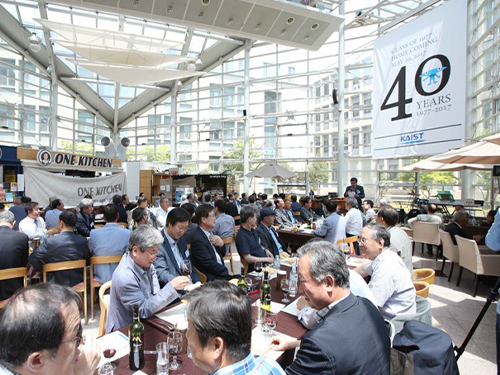 KAIST Class of '77 Celebrates 40-Year Reunion
The class of 1977 reunited on April 20 at the College of Business in Seoul campus, which was once the main campus when they were students 40 years ago. Now leaders of Korea in the sectors of industry, academia, and research, the class of ‘77 held a homecoming event in celebration of the 40th anniversary of their graduation.
The class of ’77 includes KAIST President Sung-Chul Shin and the Minister of Science, ICT and Future Planning Yanghee Choi. More than 100 graduates and 20 professors gathered at the homecoming event. Many of them were former ministers of science and technology, presidents of universities, heads of research institutes, and top managers from leading corporations such as Samsung Electronics and SK Telecom in Korea.
At the event, Professor Dong-Hoon Choi at Hangyang University, representing alumni Yoon-Mo Koo, Oh-Hyun Kwon, Dae-Young Kim, Yoo-Hyun Moon, Nam-Ho Paik, Ki Hwang Baek, Sung-Chul Shin, Mann-Ho Lee, and Sang-Bum Lee, donated a scholarship of 100 million KRW. Professor Choi said that, “This may not be a large sum of money, but we raised it with grateful hearts for the country and for KAIST. I hope this scholarship will become a small seed to raise bigger fruit.”
President Shin reminisced that, “The achievements made at KAIST during the last half century were only possible due to the dreams, visions, and innovative ideas of those who established KAIST, and the passion for research, education, and learning of our former professors and students.”
President Shin continued, “KAIST was the light of hope in the early industrialization period in Korea half a century ago, and as alumnus president I will devote body and soul for KAIST to be the light of hope in the early stages of the Industry 4.0, and thus continue to be the light of hope for the future of Korea.”
Notable guests presented include Former Minister of Science and Technology and former Provost of KAIST Kun-Mo Chung, Former Minister of Communications and former Professor Soon-Hoon Bae, Vice Chairman and CEO for Samsung Electronics Oh-Hyun Kwon, SK Telecom ICT President for Technology Ho-Soo Lee; President of Yeungnam University Gil Soo Sur; former President of the University of Seoul Sang-Bum Lee; President of the Korea Research Institute of Chemical Technology Kew-Ho Lee; and former President of the Korea Research Institute of Bioscience and Biotechnology Sang-Ki Rhee.
2017.05.23 View 7412
KAIST Class of '77 Celebrates 40-Year Reunion
The class of 1977 reunited on April 20 at the College of Business in Seoul campus, which was once the main campus when they were students 40 years ago. Now leaders of Korea in the sectors of industry, academia, and research, the class of ‘77 held a homecoming event in celebration of the 40th anniversary of their graduation.
The class of ’77 includes KAIST President Sung-Chul Shin and the Minister of Science, ICT and Future Planning Yanghee Choi. More than 100 graduates and 20 professors gathered at the homecoming event. Many of them were former ministers of science and technology, presidents of universities, heads of research institutes, and top managers from leading corporations such as Samsung Electronics and SK Telecom in Korea.
At the event, Professor Dong-Hoon Choi at Hangyang University, representing alumni Yoon-Mo Koo, Oh-Hyun Kwon, Dae-Young Kim, Yoo-Hyun Moon, Nam-Ho Paik, Ki Hwang Baek, Sung-Chul Shin, Mann-Ho Lee, and Sang-Bum Lee, donated a scholarship of 100 million KRW. Professor Choi said that, “This may not be a large sum of money, but we raised it with grateful hearts for the country and for KAIST. I hope this scholarship will become a small seed to raise bigger fruit.”
President Shin reminisced that, “The achievements made at KAIST during the last half century were only possible due to the dreams, visions, and innovative ideas of those who established KAIST, and the passion for research, education, and learning of our former professors and students.”
President Shin continued, “KAIST was the light of hope in the early industrialization period in Korea half a century ago, and as alumnus president I will devote body and soul for KAIST to be the light of hope in the early stages of the Industry 4.0, and thus continue to be the light of hope for the future of Korea.”
Notable guests presented include Former Minister of Science and Technology and former Provost of KAIST Kun-Mo Chung, Former Minister of Communications and former Professor Soon-Hoon Bae, Vice Chairman and CEO for Samsung Electronics Oh-Hyun Kwon, SK Telecom ICT President for Technology Ho-Soo Lee; President of Yeungnam University Gil Soo Sur; former President of the University of Seoul Sang-Bum Lee; President of the Korea Research Institute of Chemical Technology Kew-Ho Lee; and former President of the Korea Research Institute of Bioscience and Biotechnology Sang-Ki Rhee.
2017.05.23 View 7412 -
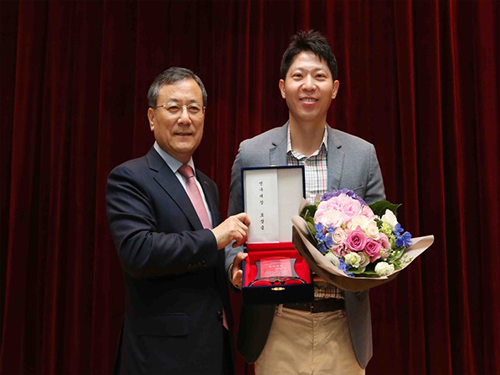 2017 KAIST Research Day Honors Professor Hoon Sohn
The 2017 KAIST Research Day recognized Professor Hoon Sohn of the Department of Civil and Environmental Engineering as Research Grand Prize Awardee in addition to the 10 most distinguished research achievements of the past year.
The Research Grand Prize recognizes the professor whose comprehensive research performance evaluation indicator is the highest over the past five years. The indicator combines the factors of the number of research contracts, IPR, royalty income, as well as research overhead cost inclusion.
During the ceremony, which was held on May 23, Professor Jun-Ho Oh of the Department of Mechanical Engineering and Professor Sang Yup Lee of the Department of Chemical and Biomolecular Engineering also won the Best Research Award. The two professors had the best scores when evaluating their research performance for one-year periods.
Meanwhile, the Research Innovation Award went to Professor YongKeun Park of the Department of Physics. The Research Innovation Award scores the factors of foreign patent registration, contracts of technological transfer and income from technology fees, technology consultations, and startups and selected Professor Park as the top winner.
Professors Yong Hee Lee of the Department of Physics and Jonghwa Shin of the Department of Material Science won the Convergence Research Award. The Convergence Research Award recognizes the most outstanding research team who created innovative research results for a year.
After the ceremony, President Chen Shiyi of the Southern University of Science and Technology gave a distinguished lecture on the “Global & Entrepreneurial Universities for the Age of the Fourth Industrial Revolution.” the Research Day ceremony, KAIST also presented the ten most distinguished research achievements made by KAIST professors during the last year as follows (Click):
▲ Commercialization of 3D Holographic Microscopy by Professor YongKeun Park of the Department of Physics
▲ Designer Proteins with Chemical Modifications by Professor Hee-Sung Park of the Department of Chemistry
▲ Lanthanum-Catalyzed Synthesis of Microporous 3D Graphene-Like Carbons in a Zeolite Template by Professor Ryong Ryoo of the Department of Chemistry
▲ Complete Prevention of Blood Loss by Self-Sealing Hemostatic Needles by Professor Haeshin Lee of the Department of Chemistry
▲ An Immunological Mechanism for the Contribution of Commensal Microbiota Against Herpes Simplex Virus Infection in Genital Mucosa by Heung Kyu Lee of the Graduate School of Medical Science and Engineering
▲ Development of a Pulse-Echo Laser Ultrasonic Propagation Imaging System by Professor Jung-Ryul Lee of the Department of Aerospace Engineering
▲ Bi-refractive Stereo Imaging for Single-Shot Depth Acquisition by Professor Min H. Kim of the School of Computing
▲ Development of Environment Friendly Geotechnical Construction Material Using Biopolymer by Professor Gye-Chun Cho of the Department of Civil and Environmental Engineering
▲ Protein Delivery Via Engineered Exosomes by Professor Chulhee Choi of the Department of Bio and Brain Engineering
▲ Hot Electron Detection Under Catalytic Reactions by Professor Jeong Young Park of the Graduate School of EEWS.
After the ceremony, President Chen Shiyi of the Southern University of Science and Technology gave a distinguished lecture on the “Global & Entrepreneurial Universities for the Age of the Fourth Industrial Revolution.”
(Photo:President Shin poses with the 2017 KAIST Research Grand Prize Winner Professor Hoon Sohn on May 23.)
2017.05.23 View 15747
2017 KAIST Research Day Honors Professor Hoon Sohn
The 2017 KAIST Research Day recognized Professor Hoon Sohn of the Department of Civil and Environmental Engineering as Research Grand Prize Awardee in addition to the 10 most distinguished research achievements of the past year.
The Research Grand Prize recognizes the professor whose comprehensive research performance evaluation indicator is the highest over the past five years. The indicator combines the factors of the number of research contracts, IPR, royalty income, as well as research overhead cost inclusion.
During the ceremony, which was held on May 23, Professor Jun-Ho Oh of the Department of Mechanical Engineering and Professor Sang Yup Lee of the Department of Chemical and Biomolecular Engineering also won the Best Research Award. The two professors had the best scores when evaluating their research performance for one-year periods.
Meanwhile, the Research Innovation Award went to Professor YongKeun Park of the Department of Physics. The Research Innovation Award scores the factors of foreign patent registration, contracts of technological transfer and income from technology fees, technology consultations, and startups and selected Professor Park as the top winner.
Professors Yong Hee Lee of the Department of Physics and Jonghwa Shin of the Department of Material Science won the Convergence Research Award. The Convergence Research Award recognizes the most outstanding research team who created innovative research results for a year.
After the ceremony, President Chen Shiyi of the Southern University of Science and Technology gave a distinguished lecture on the “Global & Entrepreneurial Universities for the Age of the Fourth Industrial Revolution.” the Research Day ceremony, KAIST also presented the ten most distinguished research achievements made by KAIST professors during the last year as follows (Click):
▲ Commercialization of 3D Holographic Microscopy by Professor YongKeun Park of the Department of Physics
▲ Designer Proteins with Chemical Modifications by Professor Hee-Sung Park of the Department of Chemistry
▲ Lanthanum-Catalyzed Synthesis of Microporous 3D Graphene-Like Carbons in a Zeolite Template by Professor Ryong Ryoo of the Department of Chemistry
▲ Complete Prevention of Blood Loss by Self-Sealing Hemostatic Needles by Professor Haeshin Lee of the Department of Chemistry
▲ An Immunological Mechanism for the Contribution of Commensal Microbiota Against Herpes Simplex Virus Infection in Genital Mucosa by Heung Kyu Lee of the Graduate School of Medical Science and Engineering
▲ Development of a Pulse-Echo Laser Ultrasonic Propagation Imaging System by Professor Jung-Ryul Lee of the Department of Aerospace Engineering
▲ Bi-refractive Stereo Imaging for Single-Shot Depth Acquisition by Professor Min H. Kim of the School of Computing
▲ Development of Environment Friendly Geotechnical Construction Material Using Biopolymer by Professor Gye-Chun Cho of the Department of Civil and Environmental Engineering
▲ Protein Delivery Via Engineered Exosomes by Professor Chulhee Choi of the Department of Bio and Brain Engineering
▲ Hot Electron Detection Under Catalytic Reactions by Professor Jeong Young Park of the Graduate School of EEWS.
After the ceremony, President Chen Shiyi of the Southern University of Science and Technology gave a distinguished lecture on the “Global & Entrepreneurial Universities for the Age of the Fourth Industrial Revolution.”
(Photo:President Shin poses with the 2017 KAIST Research Grand Prize Winner Professor Hoon Sohn on May 23.)
2017.05.23 View 15747 -
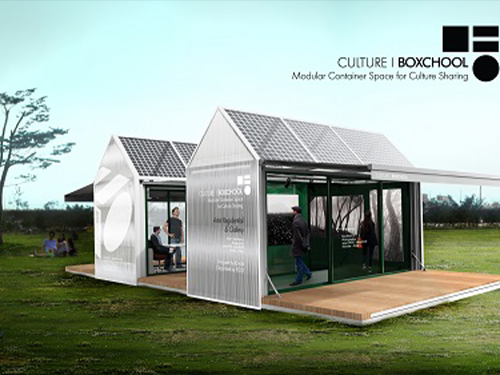 Prof. Sang-Min Bae Receives 2017 iF Design Award
Prof. Sang-Min Bae and his research team from the Industrial Design Department of KAIST submitted a winning entry to the 2017 iF Design Award named ‘Culture BOXCHOOL’.
The iF Design Award is an internationally renowned design contest that is recognized as one of the top three design awards in the world along with the Red Dot Design Award and the IDEA Design Award. It has been held annually by iF International Forum Design since 1953. A total of 5,575 entries from 59 countries entered the last competition.
Culture BOXCHOOL is a modular container space platform designed for culture sharing in isolated areas. It is delivered as a standard shipping container along with its subsidiary modular parts and it transforms into a gallery, office, or classroom. These modular parts build the interior and exterior by attaching them to the corner castings, which are standard parts on all shipping containers. Two Cultural BOXCHOOL containers can be transformed into three different types of layouts.
The containers can generate their own energy using solar panels that provide sustainable energy to equipment inside. Additionally, hot humid air can flow out through the attic vent, doors, and windows.
“With Culture BOXCHOOL, you can easily and quickly create spaces such as offices and classrooms, or you can easily disassemble and move them to another location.
Thus, it can provide everyone with equal educational opportunities and cultural enjoyment regardless of their geographical location. In addition, because it produces its own energy, it is expected to create a cultural space in a relatively harsh environment such as in developing countries. These social and economic values of Culture BOXCHOOL seem to be what led to us winning the contest. I will continue to strive to create the world’s best designs for needy people.” Professor Bae said.
The ID+IM design laboratory, a research team led by Professor Bae, has been studying philanthropy design since 2005, working on solving various problems throughout society through innovative design. They have received more than 50 awards from the most prestigious design competitions in the world.
2017.05.18 View 9947
Prof. Sang-Min Bae Receives 2017 iF Design Award
Prof. Sang-Min Bae and his research team from the Industrial Design Department of KAIST submitted a winning entry to the 2017 iF Design Award named ‘Culture BOXCHOOL’.
The iF Design Award is an internationally renowned design contest that is recognized as one of the top three design awards in the world along with the Red Dot Design Award and the IDEA Design Award. It has been held annually by iF International Forum Design since 1953. A total of 5,575 entries from 59 countries entered the last competition.
Culture BOXCHOOL is a modular container space platform designed for culture sharing in isolated areas. It is delivered as a standard shipping container along with its subsidiary modular parts and it transforms into a gallery, office, or classroom. These modular parts build the interior and exterior by attaching them to the corner castings, which are standard parts on all shipping containers. Two Cultural BOXCHOOL containers can be transformed into three different types of layouts.
The containers can generate their own energy using solar panels that provide sustainable energy to equipment inside. Additionally, hot humid air can flow out through the attic vent, doors, and windows.
“With Culture BOXCHOOL, you can easily and quickly create spaces such as offices and classrooms, or you can easily disassemble and move them to another location.
Thus, it can provide everyone with equal educational opportunities and cultural enjoyment regardless of their geographical location. In addition, because it produces its own energy, it is expected to create a cultural space in a relatively harsh environment such as in developing countries. These social and economic values of Culture BOXCHOOL seem to be what led to us winning the contest. I will continue to strive to create the world’s best designs for needy people.” Professor Bae said.
The ID+IM design laboratory, a research team led by Professor Bae, has been studying philanthropy design since 2005, working on solving various problems throughout society through innovative design. They have received more than 50 awards from the most prestigious design competitions in the world.
2017.05.18 View 9947 -
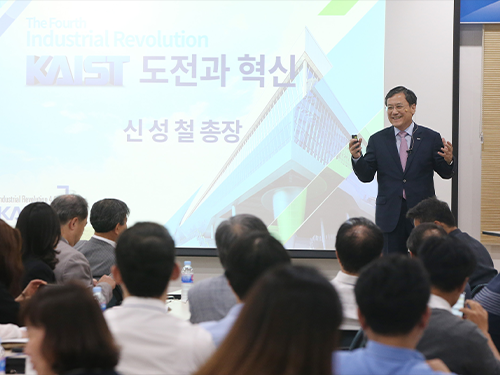 Policy Debate Series for Industry 4.0
(Photo caption: President Shin takes the podium as the first speaker of a year-long monthly policy dabate series on Industry 4.0 on May 11.)
KAIST will kick off a monthly policy debate series on Industry 4.0 every Thursday from May 11 at the Startup KAIST building. The year-long series, featuring professors from key technology fields associated with Industry 4.0, is designed to help policy makers from government, industry, and research institutes respond better to the ramifications that Industry 4.0 brings about in each sector.
The series will help them establish the vision and strategy that will work for the new industrial environment to take the lead in the new industrial era.
Twelve professors, including President Sung-Chul Shin, from departments that are researching emerging technologies will speak on the megatrend of new technology, while facilitating debates and Q& A sessions with participants.
The participants will include officials from the government complexes in Sejong and Daejeon cities, government-funded research institutes in Daejeon, and businessmen, among others. For registration, please go to https://startup.kaist.ac.kr/register.
Schedule
Speaker
Theme
May 11
President Sung-Chul Shin
Challenges and Innovations of KAIST in the Era of Industry 4.0
June 8
Professor Jonghwan Kim
Machine Intelligence and Deep Learning
July 6
Professor Jun Ho Oh
Robot Technology and the Future
Aug. 3
Professor Hyunchul Shim
Unmanned Vehicle Technology and Industry 4.0
Sept. 7
Professor Hawoong Jeong
Complex Systems and Data Science
Oct. 12
Professor Yongdae Kim
Technology, Policy, and the Fostering of Talents: Industry 4.0 and Information Protection
Nov. 9
Professor Sang Yup Lee
The Role of Biotechnology in Industry 4.0
Dec. 7
Professor Meeyoung Cha
AI-Based Research for Fake News Detection
2018 Jan. 4
Professor Joungho Kim
Innovation for the Korean Semiconductor Industry: Kim’s Law
Feb. 8
Professor Jaekyun Moon
Education for Industry 4.0
March 8
Professor Sang Kil Cha
Artificial Intelligence Cyber Warfare: Its Present and Future
April 5
Professor Jaeseung Jeong
The Future of Brain Engineering and Artificial Intelligence
2017.05.08 View 11968
Policy Debate Series for Industry 4.0
(Photo caption: President Shin takes the podium as the first speaker of a year-long monthly policy dabate series on Industry 4.0 on May 11.)
KAIST will kick off a monthly policy debate series on Industry 4.0 every Thursday from May 11 at the Startup KAIST building. The year-long series, featuring professors from key technology fields associated with Industry 4.0, is designed to help policy makers from government, industry, and research institutes respond better to the ramifications that Industry 4.0 brings about in each sector.
The series will help them establish the vision and strategy that will work for the new industrial environment to take the lead in the new industrial era.
Twelve professors, including President Sung-Chul Shin, from departments that are researching emerging technologies will speak on the megatrend of new technology, while facilitating debates and Q& A sessions with participants.
The participants will include officials from the government complexes in Sejong and Daejeon cities, government-funded research institutes in Daejeon, and businessmen, among others. For registration, please go to https://startup.kaist.ac.kr/register.
Schedule
Speaker
Theme
May 11
President Sung-Chul Shin
Challenges and Innovations of KAIST in the Era of Industry 4.0
June 8
Professor Jonghwan Kim
Machine Intelligence and Deep Learning
July 6
Professor Jun Ho Oh
Robot Technology and the Future
Aug. 3
Professor Hyunchul Shim
Unmanned Vehicle Technology and Industry 4.0
Sept. 7
Professor Hawoong Jeong
Complex Systems and Data Science
Oct. 12
Professor Yongdae Kim
Technology, Policy, and the Fostering of Talents: Industry 4.0 and Information Protection
Nov. 9
Professor Sang Yup Lee
The Role of Biotechnology in Industry 4.0
Dec. 7
Professor Meeyoung Cha
AI-Based Research for Fake News Detection
2018 Jan. 4
Professor Joungho Kim
Innovation for the Korean Semiconductor Industry: Kim’s Law
Feb. 8
Professor Jaekyun Moon
Education for Industry 4.0
March 8
Professor Sang Kil Cha
Artificial Intelligence Cyber Warfare: Its Present and Future
April 5
Professor Jaeseung Jeong
The Future of Brain Engineering and Artificial Intelligence
2017.05.08 View 11968